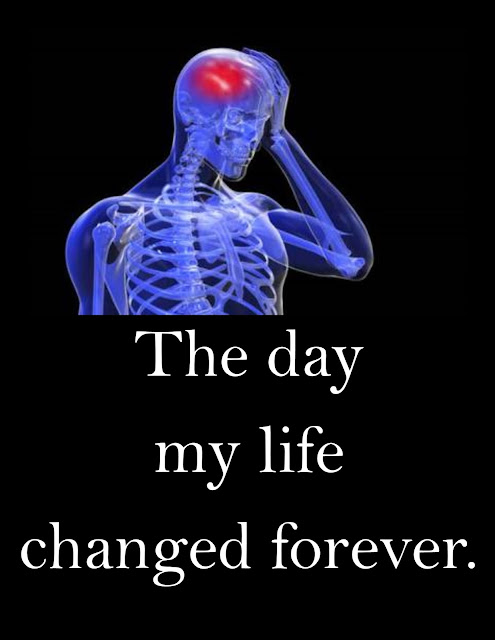#TheStrokeZone WHAT IS ACQUIRED BRAIN INJURY (ABI)
Acquired brain injury is an injury to the brain after birth. There are many possible causes, including a fall, a road or other accident, brain tumor or stroke.
There are two types of acquired brain injury, traumatic and non-traumatic.
Traumatic brain injury
Traumatic brain injury (TBI) is most commonly associated with accidents, assaults and falls, which lead to a head injury and trauma to the brain.
There are many factors that can contribute to a brain injury. All injuries are unique and two are never the same. The severity can differ and symptoms can range from dizziness, headaches, cognitive functioning and behavioural changes. Traumatic brain injury can be classified into two categories; mild and severe.
Mild TBI is when a loss of consciousness, confusion or disorientation is for less than 30 minutes. The symptoms of this type of injury can have a delayed onset and be subtle, with the condition predominantly would improve.
Severe TBI is when there is lifelong damage to the brain. This injury occurs when loss of consciousness is for over 6 hours and can impact memory, sensory and behavioural actions as well as seizures.
Who is affected?
As a type of acquired brain injury, in the United Kingdom there was a total of 348,934 admissions to hospital in 2014, which equates to someone being admitted every 90 seconds.
Non-traumatic brain injury
Non-traumatic brain injury (non-TBI) occurs as a result of internal body malfunctions, such as stroke’s, brain tumours and meningitis.
Some of the more common causes include infections, lack of oxygen, tumours and bleeding on the brain. Suffocation and surgical procedures can lead to non-TBI and in some cases, traumatic brain injuries may lead to non-TBI. Substance and alcohol abuse can lead to the condition.
Who is affected?
Acquired brain injuries (ABI) have increased in the United Kingdom by 10 percent over the past 10 years and the last recorded amount of cases of an ABI is 348,934 in 2014.
How we help
Acquired brain injury is one of Brain Research Trusts three priority research areas.
Brain Research Trust funds research at the Leopold Muller imaging lab which looks at the impact of acquired brain injuries and how stroke’s effect the condition and we fund the running costs of the Leopold Muller imaging lab which looks into acquired brain injuries, including TBI.
There are two types of acquired brain injury, traumatic and non-traumatic.
Traumatic brain injury
Traumatic brain injury (TBI) is most commonly associated with accidents, assaults and falls, which lead to a head injury and trauma to the brain.
There are many factors that can contribute to a brain injury. All injuries are unique and two are never the same. The severity can differ and symptoms can range from dizziness, headaches, cognitive functioning and behavioural changes. Traumatic brain injury can be classified into two categories; mild and severe.
Mild TBI is when a loss of consciousness, confusion or disorientation is for less than 30 minutes. The symptoms of this type of injury can have a delayed onset and be subtle, with the condition predominantly would improve.
Severe TBI is when there is lifelong damage to the brain. This injury occurs when loss of consciousness is for over 6 hours and can impact memory, sensory and behavioural actions as well as seizures.
Who is affected?
As a type of acquired brain injury, in the United Kingdom there was a total of 348,934 admissions to hospital in 2014, which equates to someone being admitted every 90 seconds.
Non-traumatic brain injury
Non-traumatic brain injury (non-TBI) occurs as a result of internal body malfunctions, such as stroke’s, brain tumours and meningitis.
Some of the more common causes include infections, lack of oxygen, tumours and bleeding on the brain. Suffocation and surgical procedures can lead to non-TBI and in some cases, traumatic brain injuries may lead to non-TBI. Substance and alcohol abuse can lead to the condition.
Who is affected?
Acquired brain injuries (ABI) have increased in the United Kingdom by 10 percent over the past 10 years and the last recorded amount of cases of an ABI is 348,934 in 2014.
How we help
Acquired brain injury is one of Brain Research Trusts three priority research areas.
Brain Research Trust funds research at the Leopold Muller imaging lab which looks at the impact of acquired brain injuries and how stroke’s effect the condition and we fund the running costs of the Leopold Muller imaging lab which looks into acquired brain injuries, including TBI.
Information provided by


Please look at: www.invesdor.com/Medicortex - thank you, Adrian
ReplyDeletehttps://books.google.com/books?hl=en&lr=&id=3ZKLAAAAQBAJ&oi=fnd&pg=PT6&dq=TBI+computers+facebook&ots=ljMcDWO_Iw&sig=N5jkQ4THlR9fnC8mnoEqnhKWv98#v=onepage&q&f=false
ReplyDelete